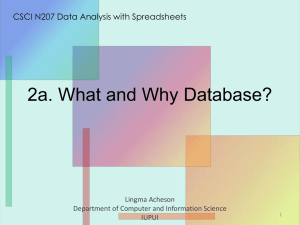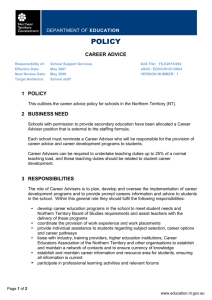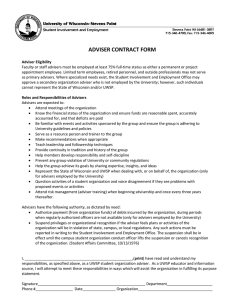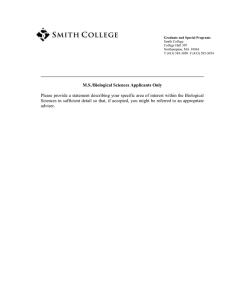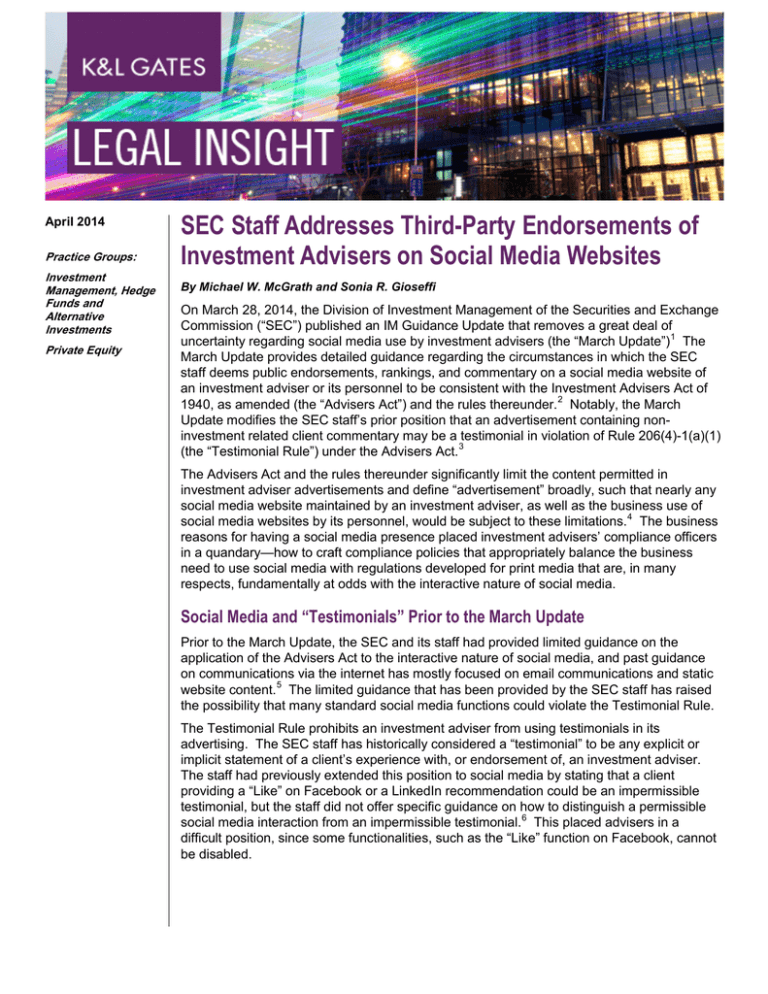
April 2014
Practice Groups:
Investment
Management, Hedge
Funds and
Alternative
Investments
Private Equity
SEC Staff Addresses Third-Party Endorsements of
Investment Advisers on Social Media Websites
By Michael W. McGrath and Sonia R. Gioseffi
On March 28, 2014, the Division of Investment Management of the Securities and Exchange
Commission (“SEC”) published an IM Guidance Update that removes a great deal of
uncertainty regarding social media use by investment advisers (the “March Update”) 1 The
March Update provides detailed guidance regarding the circumstances in which the SEC
staff deems public endorsements, rankings, and commentary on a social media website of
an investment adviser or its personnel to be consistent with the Investment Advisers Act of
1940, as amended (the “Advisers Act”) and the rules thereunder. 2 Notably, the March
Update modifies the SEC staff’s prior position that an advertisement containing noninvestment related client commentary may be a testimonial in violation of Rule 206(4)-1(a)(1)
(the “Testimonial Rule”) under the Advisers Act. 3
The Advisers Act and the rules thereunder significantly limit the content permitted in
investment adviser advertisements and define “advertisement” broadly, such that nearly any
social media website maintained by an investment adviser, as well as the business use of
social media websites by its personnel, would be subject to these limitations.4 The business
reasons for having a social media presence placed investment advisers’ compliance officers
in a quandary—how to craft compliance policies that appropriately balance the business
need to use social media with regulations developed for print media that are, in many
respects, fundamentally at odds with the interactive nature of social media.
Social Media and “Testimonials” Prior to the March Update
Prior to the March Update, the SEC and its staff had provided limited guidance on the
application of the Advisers Act to the interactive nature of social media, and past guidance
on communications via the internet has mostly focused on email communications and static
website content. 5 The limited guidance that has been provided by the SEC staff has raised
the possibility that many standard social media functions could violate the Testimonial Rule.
The Testimonial Rule prohibits an investment adviser from using testimonials in its
advertising. The SEC staff has historically considered a “testimonial” to be any explicit or
implicit statement of a client’s experience with, or endorsement of, an investment adviser.
The staff had previously extended this position to social media by stating that a client
providing a “Like” on Facebook or a LinkedIn recommendation could be an impermissible
testimonial, but the staff did not offer specific guidance on how to distinguish a permissible
social media interaction from an impermissible testimonial.6 This placed advisers in a
difficult position, since some functionalities, such as the “Like” function on Facebook, cannot
be disabled.
SEC Staff Addresses Third-Party Endorsements of
Investment Advisers on Social Media Websites
The March Update
The March Update provides welcome clarification regarding the publication of real-time
information on social media or the Internet, and it contains specific examples of social media
interactions that would (and would not) be deemed to contain impermissible testimonials.
Although it explicitly states that many common social media interactions will not be
impermissible testimonials, the March Update also provides guidelines, including safeguards
against the types of abuses that the Testimonial Rule was designed to address—namely, the
risk that an investment adviser would emphasize favorable testimonials and ignore
unfavorable ones, thus creating the misleading inference that cherry-picked testimonials are
typical of the experience of the adviser’s clients. 7 While the March Update does not name
particular websites, it reflects an understanding by the staff of common social media
websites that advisers may use, such as Facebook, LinkedIn, and Yelp.
Guidelines for Third-Party Postings
According to the March Update, an investment adviser that maintains or links to a social
media site that contains public commentary (which may include client commentary) would
not be in violation of the Testimonial Rule if it complies with the following guidelines: 8
• Independence of the Social Media Website. The social media website must be
independent of the investment adviser and its affiliated parties.9 The investment adviser
could advertise on the social media website if it is apparent that any public commentary is
separate from the advertisement, and if the website does not alter the public commentary
as a result of receiving advertising revenue.
• Independence of Third-Party Commentary. Neither the investment adviser nor its
personnel may directly or indirectly author any commentary or pay others to author
commentary.
• Completeness of Content. All public commentary must be viewable, and any searchable
or sortable functions must be in a content-neutral manner.
• No Modification of Content. The social media website must allow for independent
commentary on an unrestricted, real-time basis. Generally, if an adviser modifies thirdparty content in any way, including by suppressing, modifying or prioritizing any content,
the content would be deemed an impermissible testimonial. However, the social media
website may modify or remove content in accordance with its published content
guidelines, for example, to remove defamatory statements, profanity, racially offensive
statements or material that infringes on intellectual property rights.
Client Lists
The staff clarified in the March Update that, consistent with its prior guidance, it would not
deem a list of contacts or “friends” on the social media website of an adviser or its personnel
to be an impermissible testimonial, even if the list represented a partial client list. However,
the staff cautioned that such a list could nevertheless be a misleading advertisement if there
is an inference that the contacts or “friends” have experienced favorable investment results,
or if the adviser otherwise manipulates or presents the list in a misleading manner.
2
SEC Staff Addresses Third-Party Endorsements of
Investment Advisers on Social Media Websites
Community Pages
The March Update cautioned investment advisers against publishing content or linking to
websites created by third parties that contain public commentary on “a myriad of investment
topics,” including the investment adviser or its personnel, especially if the investment adviser
has a material connection to the website or is directly or indirectly responsible for its
content. 10
Scope of Guidance
The March Update relates only to the publication of information through independent social
media websites and posting, linking, or otherwise referring to such information. The staff
cautioned that the March Update does not relate to advertisements on paper, radio or
television media and that it would continue to view selective reprints of third-party
commentary as an impermissible testimonial. It appears, however, that the staff will now
permit non-investment related commentary, such as comments on an adviser’s religious
affiliations or community service, in all advertisements (rather than only on social media).
Notably, the March Update focuses on an investment adviser’s business use of social media,
but it does not distinguish among business-related activities and the private activities of its
personnel on websites that may encompass both professional and personal use, such as
LinkedIn.11
Compliance Policies and Procedures
The SEC staff has stated that investment advisers with a social media presence should
implement compliance policies and procedures that are tailored appropriately to their
activities and their personnel.12 In light of the March Update, investment advisers should
consider compliance policies that:
• expressly identify the social media websites that the investment adviser and its
employees may use for business purposes, and require approval by the firm’s CCO or
another appropriate officer to add websites to this list;
• prohibit employees from asking clients or the public to post comments about the adviser
or any of its personnel, and, in particular, prohibit employees from requesting positive
commentary or providing a benefit such as a discount in services in exchange for posting
a comment;
• prohibit employees from posting unauthorized comments on the adviser’s social media
sites; and
• prohibit any manipulation of third-party posts on the adviser’s social media sites.
Finally, investment advisers should consider implementing training related to social media
that seeks to promote compliance with, and prevent violations of, the federal securities laws
and the firm’s internal policies.13 Investment advisers should also consider whether their
social media policies address applicable recordkeeping requirements, monitor compliance by
their employees, and follow-up on any potential violations.
3
SEC Staff Addresses Third-Party Endorsements of
Investment Advisers on Social Media Websites
Authors:
Michael W. McGrath
Sonia R. Gioseffi
michael.mcgrath@klgates.com
+1.617.951.9123
sonia.gioseffi@klgates.com
+1.415.882.8006
Anchorage Austin Beijing Berlin Boston Brisbane Brussels Charleston Charlotte Chicago Dallas Doha Dubai Fort Worth Frankfurt
Harrisburg Hong Kong Houston London Los Angeles Melbourne Miami Milan Moscow Newark New York Orange County Palo Alto Paris
Perth Pittsburgh Portland Raleigh Research Triangle Park San Diego San Francisco São Paulo Seattle Seoul Shanghai Singapore Spokane
Sydney Taipei Tokyo Warsaw Washington, D.C. Wilmington
K&L Gates practices out of 48 fully integrated offices located in the United States, Asia, Australia, Europe, the
Middle East and South America and represents leading global corporations, growth and middle-market companies,
capital markets participants and entrepreneurs in every major industry group as well as public sector entities,
educational institutions, philanthropic organizations and individuals. For more information about K&L Gates or its
locations, practices and registrations, visit www.klgates.com.
This publication is for informational purposes and does not contain or convey legal advice. The information herein should not be used or relied upon in
regard to any particular facts or circumstances without first consulting a lawyer.
© 2014 K&L Gates LLP. All Rights Reserved.
1
Guidance on the Testimonial Rule and Social Media, Guidance Update, Division of Investment Management, SEC, No.
2014-04 (March 2014) (“March Update”).
2
In rescinding this position, the staff noted the benefit that social media provides on “consumers’ ability to research and
conduct their own due diligence.” March Update.
3
Rule 206(4)-1(a)(1) does not define “testimonial,” but the SEC staff has interpreted the “term to include a statement of a
client’s experience with, or endorsement of, an investment adviser.” Investment Adviser Use of Social Media, National
Examination Risk Alert, Office of Compliance Inspections and Examinations, SEC, Vol. 1, Issue 1 (Jan. 4, 2012) (“2012
Risk Alert”).
4
See 2012 Risk Alert.
5
Filing Requirements for Certain Electronic Communications, Guidance Update, Division of Investment Management,
SEC, No. 2013-01 (March 2013) and 2012 Risk Alert. Given the limited SEC guidance, many advisers referred to the
Financial Industry Regulatory Authority’s (“FINRA”) three regulatory notices: Supervision of Electronic Communications,
Regulatory Notice 07-59, FINRA (Dec. 2007); Social Media Web Sites, Regulatory Notice 10-06, FINRA (Jan. 2010); and
Social Media Websites and the Use of Personal Devices for Business Communications, Regulatory Notice 11-39, FINRA
(Aug. 2011).
6
2012 Risk Alert.
7
Advisers need to continue to be mindful of the facts and circumstances in their use of social media and, in particular, be
mindful of Rule 206(4)-1(a)(5).
8
The staff did, however, caution that what is or is not an impermissible testimonial would depend on the facts and
circumstances, and the adviser would be subject to other provisions of the Advisers Act.
9
The staff, in the March Update, clearly limited its guidance to third-party websites with no material connection to the
investment adviser or its personnel. Although third-party reviews on proprietary websites are increasingly common in the
consumer goods space, the staff would consider such reviews an impermissible testimonial pursuant to the March
Update.
4
SEC Staff Addresses Third-Party Endorsements of
Investment Advisers on Social Media Websites
10
The staff has previously noted that an investment adviser may be deemed to “adopt” the content of such a site, or to be
“entangled” with the creation of such a site, such that the adviser is responsible for the content and its compliance with the
advertising rules under the Advisers Act.
11
In determining the appropriate supervision of employee use of social media, advisers must be mindful of state privacy
law requirements. Social Media at the Intersection of Personal and Professional: Challenges for Investment Advisers and
Broker-Dealers, S. Gioseffi and M. Perlow, Vol. 27, No. 9, Insights (Sept. 2013).
12
For guidance on drafting compliance policies and procedures related to static websites and social media, see the 2012
Risk Alert.
13
See 2012 Risk Alert.
5



